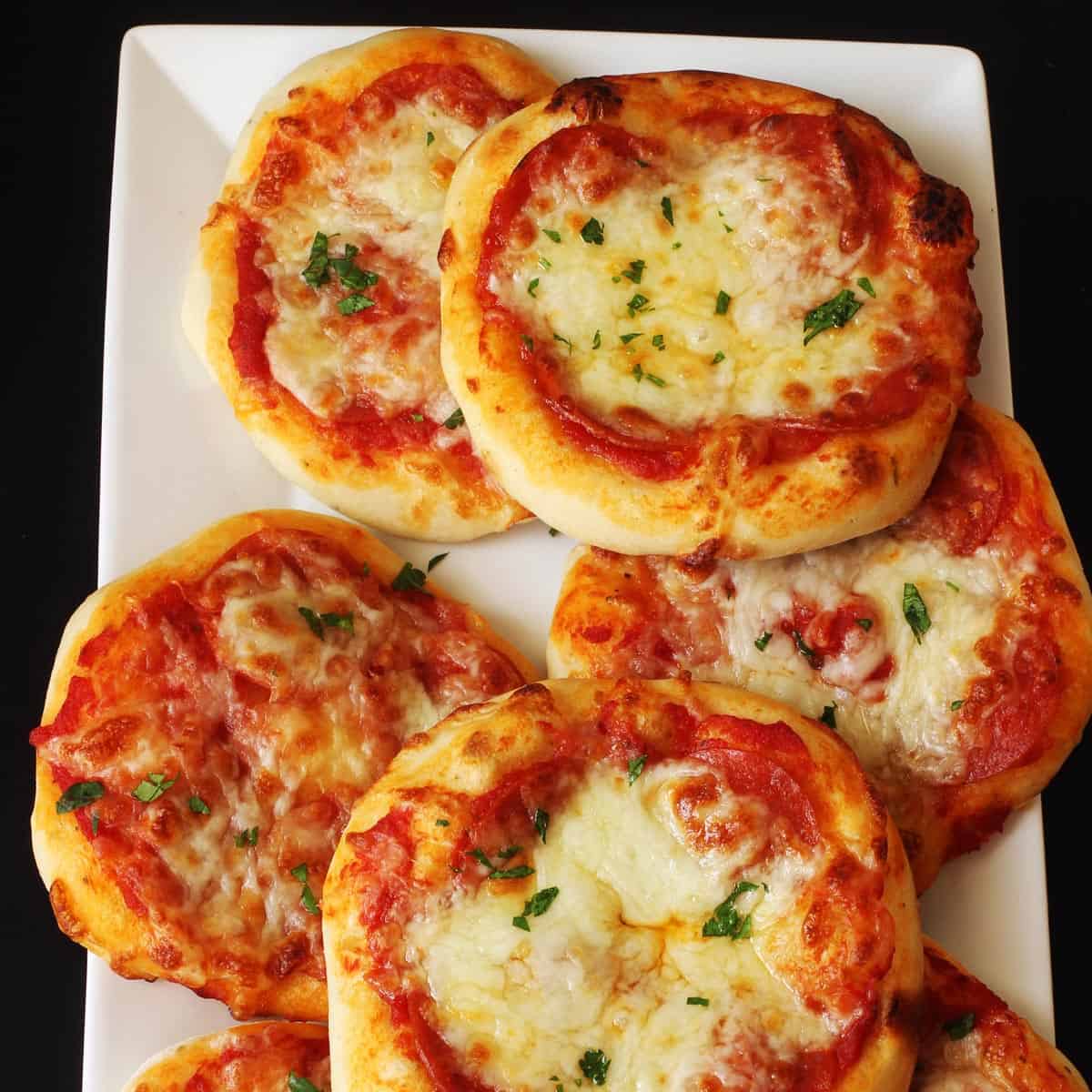Mini Pizza Magic: A Guide for Busy Parents to Create Tiny Treats
Hello, awesome parents out there! Are you on the lookout for a fun, interactive, and scrumptious activity that you can enjoy with your little chefs? Well, you’re in for a treat with this ultimate guide to making mini pizzas at home!
Mini pizzas are more than just a quick snack; they’re a canvas for creativity, a tool for teaching, and let’s be honest, a delicious little slice of heaven. In this guide, we’ll walk through the ins and outs of mini pizza preparation, topping combinations, and even how to make the experience educational and utterly fun!
Why Mini Pizzas are a Smash Hit for Parents and Kids Alike
Before we jump into the how-to’s, let’s talk about why mini pizzas should be your new go-to for family cooking sessions:
- Everyone Gets a Slice of Creativity: With individual pizzas, each family member can customize their toppings. It’s like having your own personal canvas, but edible!
- Portion Control: Mini pizzas help you manage the servings, so they’re ideal for a balanced diet and perfect for little tummies.
- Quick and Easy: Time-crunched? No problem. Mini pizzas can be made in a flash, making them suitable for a quick dinner or a snack.
- Educational Fun: Teaching moments abound! From math with measuring ingredients to science with baking, your kids will learn while they cook.
- Social Skills and Teamwork: Preparing food together strengthens bonds and teaches collaboration and patience.
Getting Started with Mini Pizza Basics
Now, let’s set the groundwork for your mini pizza extravaganza. Here are the essential steps to get started:
Choosing Your Base
Your mini pizza journey begins with the base. You can go the extra mile by making your dough from scratch or keep things super simple with store-bought options.
- Homemade Dough: A basic dough requires few ingredients – flour, yeast, water, salt, and a bit of sugar. Kneading dough is a delightful sensory experience for kids and a great workout for the arms!
- Store-Bought Alternatives: Short on time? Grab some pre-made mini pizza crusts, English muffins, or even bagels. These are fantastic for impromptu pizza parties and ensure everyone gets to create their ‘master-pepperoni-piece’ in no time.
The Sauce Story
The sauce is a critical layer of your mini pizza. Tomato sauce is the classic choice, but don’t hesitate to think outside the box. Pesto, white garlic sauce, or even a simple brush of olive oil can serve as your pizza’s saucy foundation. Have your kids help out with spreading the sauce – it’s surprisingly satisfying!
Toppings Galore: Unleash the Flavor!
This is where the fun truly begins! Provide a variety of toppings for your kids to choose from. Here’s a list of suggestions to spark creativity:
- Veggies: Sliced bell peppers, onions, mushrooms, olives, and cherry tomatoes are colorful and packed with nutrients.
- Proteins: Pepperoni slices, cooked sausage, diced chicken, or even tofu can be great sources of protein, and they’re yummy, too!
- Something Cheesy: Mozzarella is a classic, but why not experiment with cheddar, feta, or vegan cheese?
- A Little Extra: Pineapple cubes, jalapenos, artichokes, or a drizzle of BBQ sauce can add that special zing.
Remember to encourage your kids to taste different toppings. It’s a fabulous way to expand their palates in a fun and no-pressure environment.
Cooking Together: The Mini Pizza Bonding Experience
Great! So you’ve prepped your ingredients, and the kitchen smells like a pizzeria already. It’s time to crank up the oven and enjoy the hands-on experience of shaping, topping, and baking your creations. Oven mitts at the ready?
The best temperature for baking mini pizzas is usually around 425°F (220°C), which achieves a crispy crust and nicely melted cheese. Keep an eye on the oven, as these little delights cook quickly – usually within 10 to 15 minutes, depending on crust thickness and topping load.
While the pizzas are baking, it’s a perfect time to chat about the day, tell stories, or ponder the fascinating process of how dough puffs up in the heat. Before you know it, the oven timer will ding, and you’ll be presented with golden, bubbly, personal-sized pizzas that your kids helped bring to life.
Mini pizzas aren’t just a meal; they’re memory-makers. So slip on those aprons, gather around the kitchen island, and embark on a culinary adventure that’s sure to charm both the taste buds and hearts of your family. Stay tuned – there’s still plenty of yumminess to uncover as we dive deeper into the world of mini pizzas!

5 Things Every Parent Should Know When Prepping Mini Pizzas
1. Safety Comes First
Before you begin, it’s essential to discuss kitchen safety with your kids. Make sure they understand the importance of washing hands and keeping a clean workspace. Supervise the use of any kitchen tools and remind them that ovens are hot and should only be used with the help of an adult. Safety first makes for happy cooking memories!
2. Prep is Key
Get ahead of the game by preparing all your toppings and setting them out ‘buffet-style’. This not only makes the process smoother but also avoids the mess and stress that can come from rushing to chop veggies or grate cheese while hungry kids wait. Prepping can also be a learning opportunity—have your kids help where appropriate!
3. Embrace the Mess
Accept that cooking with kids can get a little messy—and that’s okay! Set up your workspace in a way that’s easy to clean after your cooking adventure. Use baking sheets, parchment paper, or non-stick mats to catch any spillovers. And remember, a little mess means a lot of fun and a priceless bonding experience.
4. Creativity is Encouraged
Mini pizzas are the perfect chance to let your kids’ imaginations run wild. Encourage them to make faces with their toppings, explore color combinations, or even try to spell their names with cheese. There’s no ‘wrong’ way to decorate a pizza, and showing kids that cooking is a form of expression is wonderfully liberating.
5. Make it a Teachable Moment
Whether it’s counting slices of pepperoni, dividing the pizzas into equal parts (hello, fractions!), or considering the chemistry of yeast, there’s no shortage of educational value in pizza-making. Learning can be delicious, and your mini pizza workshop is the perfect classroom!
Getting Your Mini Pizzas to Perfection
Success in the kitchen is all about the little details. These extra tips will ensure your mini pizzas turn out just right:
- Lukewarm Water for Dough: If you’re making dough from scratch, use lukewarm water to activate the yeast. Too hot and you’ll kill it; too cold and it won’t wake up.
- Rest the Dough: Let your dough rest to improve the texture and flavor of your crust. It’s also a great break time activity to chat with your kids!
- Use a Pizza Stone or Baking Sheet: To avoid soggy bottoms, a heated pizza stone or a pre-heated baking sheet works wonders in giving your pizzas a crispy foundation.
- Eyeball the Oven: Since mini pizzas cook quickly, keep an eye on them in the oven to prevent any burnt disappointments.
- Let Them Cool: After baking, give the mini pizzas a moment to cool before slicing. This also helps the cheese set and prevents potential mouth burns.
Equipped with these tips and a sense of culinary adventure, you’re all set to embark on your mini pizza-making journey. Remember, cooking with your kids is about more than just the yummy food—it’s about spending quality time and creating joy-filled memories that will last a lifetime. Now, let’s get those mini pizzas in the oven and watch as your kitchen transforms into a bustling hub of giggles, learning, and delectable eats. On your mark, get set, bake!
For more great articles please see here. For more information see here
Disclaimer
The articles available via our website provide general information only and we strongly urge readers to exercise caution and conduct their own thorough research and fact-checking. The information presented should not be taken as absolute truth, and, to the maximum extent permitted by law, we will not be held liable for any inaccuracies or errors in the content. It is essential for individuals to independently verify and validate the information before making any decisions or taking any actions based on the articles.




